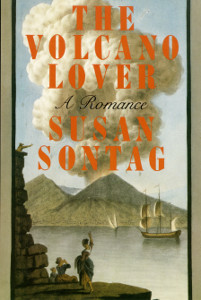The Volcano Lover
1992 novel by Susan Sontag From Wikipedia, the free encyclopedia
The Volcano Lover is a historical novel by Susan Sontag, published in 1992. Set largely in Naples, it focuses upon Emma Hamilton, her marriage to Sir William Hamilton, the scandal relating to her affair with Lord Nelson, her abandonment, and her descent into poverty. The title comes from William Hamilton's interest in volcanoes, and his investigations of Mount Vesuvius.
 | |
| Author | Susan Sontag |
|---|---|
| Language | English |
| Publisher | Farrar, Straus and Giroux |
Publication date | 1992 |
| Publication place | United States |
| Media type | |
| Pages | 419 pp |
| ISBN | 978-0-374-28516-6 |
| OCLC | 25874591 |
Reception
Summarize
Perspective
The Volcano Lover has largely been praised by literary critics. Lettie Ransley of The Guardian called it "as big, rich and complex as one might expect" and wrote,
The Volcano Lover is a powerful, intricate novel of ideas: frequently inflected with Sontag's feminism, it applies a modern lens to the Enlightenment's moral, social and aesthetic concerns. Yet it is also a tender inventory of desire: intricately mapping the modulation from the cold mania of the collector to the lover's passion.[1]
The writer John Banville praised the work, noting that Sontag's decision to write a romantic historical novel was "a surprise." He remarked, "The Volcano Lover, despite a few nods of acknowledgment toward post-modernist self-awareness, is a big, old-fashioned broth of a book. Sir Walter Scott would surely have approved of it; in fact, he would probably have enjoyed it immensely."[2]
Candia McWilliam of The Independent lauded the book, opining:
In The Volcano Lover height and control are buoyed up by clear thinking; although it descants, sometimes at essay length, upon abstractions, there is no 'cabinet of curiosities' disjunction between rumination and fiction such as decks so many modern novels in fustian. Sontag embroils the reader in her greater themes through the truth and tact of her depiction of smaller, no less preoccupying events.[3]
The novel was also praised by Michiko Kakutani of The New York Times.[4]
References
Wikiwand - on
Seamless Wikipedia browsing. On steroids.
